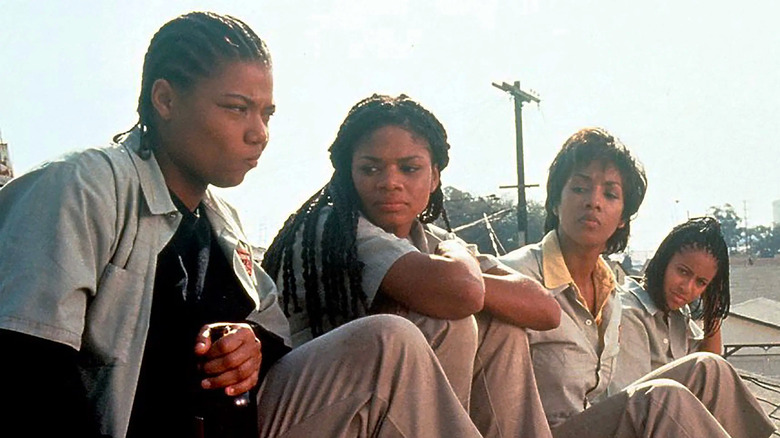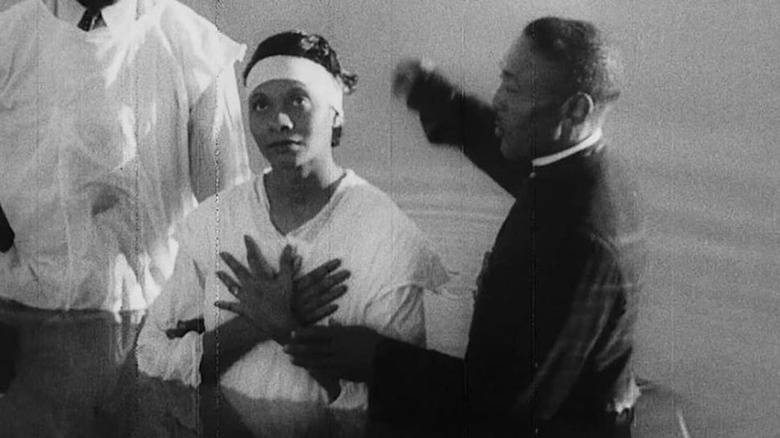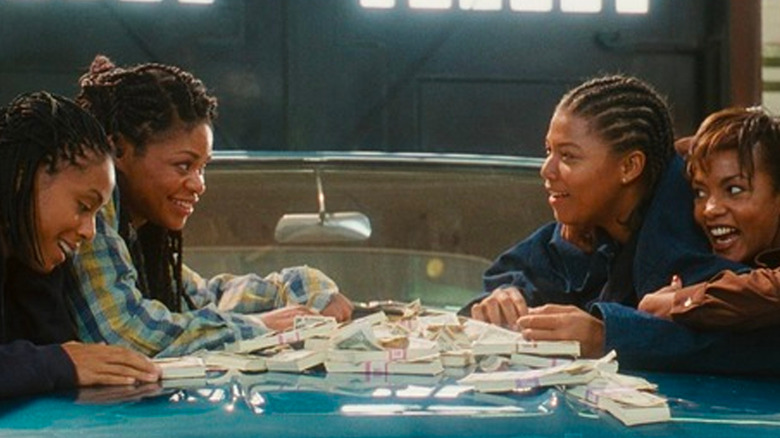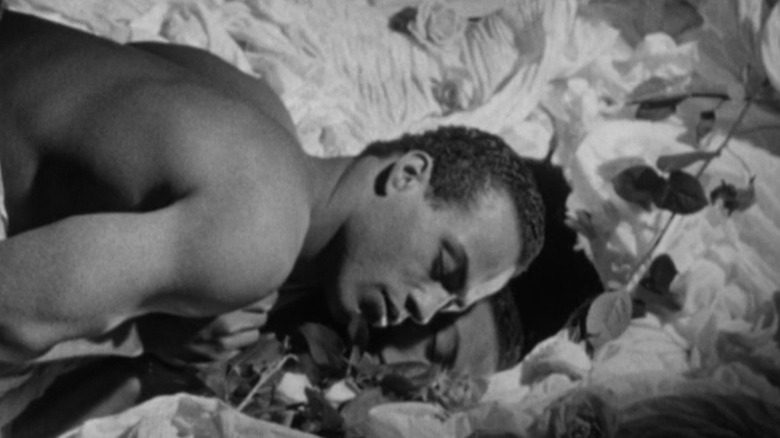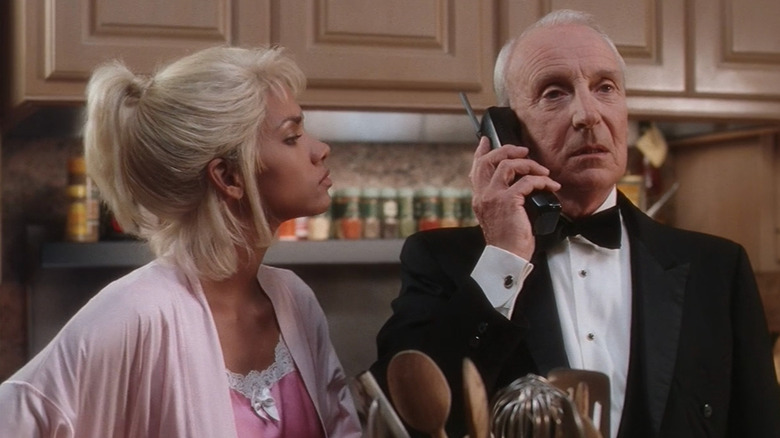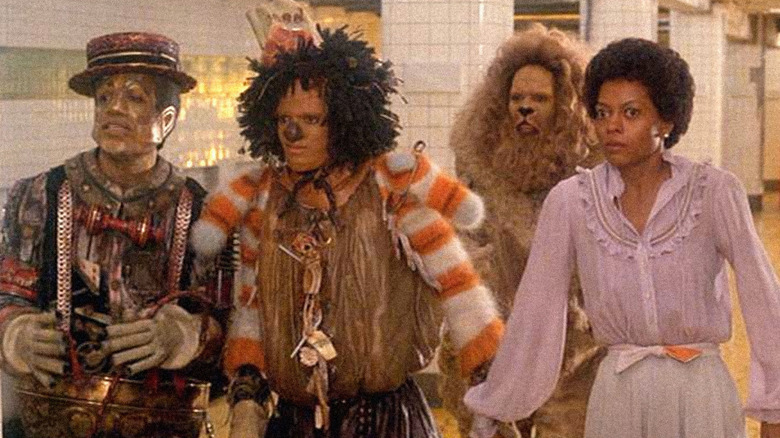5 Black Films That Aren't In The Criterion Collection (But Definitely Should Be)
The Criterion Collection touts itself as every film lover's dream — and in the age of total cinephilia, this could not be more true. The company is one of the biggest names in home video; Wes Anderson has called it "the Louvre of movies." It specializes in preserving and distributing "important" films, from hard-to-find indies to equally-obscure international features, seminal classics, and significant historical achievements in film. It's known for curating the best in cinema, so it can be pretty picky about the titles that are chosen — a habit that's attracted a fair amount of scrutiny in recent years.
In 2020, The New York Times actually conducted a study exposing the clear racial blind spots in the Criterion Collection. It revealed that, out of over a thousand films within the canon, less than 10 had been helmed by Black directors. The Times spoke to Criterion president Peter Becker in the same piece, where he admitted that the lack of Black voices was "harmful" and a glaring issue for the Collection to address moving forward. And, believe it or not, Criterion has done just that.
Since then, the amount of Black directors in the collection has doubled; even more are streaming on Criterion's online service. Becker promised to bring in more Black voices behind the scenes as well, and even tapped Maya Cade (the founder of the emerging Black Film Archive) to help curate more diverse titles.
The company's post-callout efforts have been admirable, especially during Black History Month, but that doesn't change the fact that there's still a lot of work to be done. Criterion's streaming platform is shouldering most of the responsibility by offering a trove of Black films — but many of them are phased out within months, never to be seen again, which directs attention back to the gaps that remain in Criterion's physical collection.
The process of acquiring film rights and sponsoring restorations is not one that produces immediate results, but it's important to bolster the official canon when possible. So just in case Criterion needs a nudge, here are my own personal nominations for Black-directed films that deserve some love from the collection.
The Blood Of Jesus
Contrary to conventional belief, Black filmmakers have, in fact, been around for nearly as long as the medium of film itself — just in a much less-prevalent capacity. The "race film" is but one testament to their desire to tell stories from their own unique perspective — and undo the indelible harm caused by D. W. Griffith's "Birth of a Nation." Some of these films were made as far back as 1920, and a great many shorts and features have been restored by Criterion's contemporary, Kino Classics.
One of the most famous race films of the era is "The Blood of Jesus," a 1941 film by Spencer Williams. Part Orphean fable, part snapshot of a rural Black community, the film follows a woman who, after being shot by her husband, must choose between heaven and hell. Nowadays, Williams is better known as the actor who portrayed Andy on "Amos 'n' Andy," but his work as a filmmaker helped pioneer the practice for so many. He's not the only director of that time who deserves recognition, but again, the Criterion folks have to start somewhere, don't they?
Set It Off
You may not be immediately familiar with the name F. Gary Gray, but his filmography, while short, speaks for itself. Gray is a genre filmmaker best known for films like "Friday," "The Italian Job," and "Straight Outta Compton." He's even recently dabbled in the odd blockbuster ("The Fate of the Furious" and "Men in Black: International," both a bit cringey in their own right), but Gray shines best when depicting the street-level grit that first put him on the map, and it doesn't get much better than "Set It Off."
What makes the film so incredibly worthy of Criterion status is its rendering of the Black female perspective. That "Set It Off" emerged in the midst of the golden age of Black cinema made its premise — that of four working class women who rob banks to ease their societal woes — not only possible, but highly profitable. The '90s were a seminal era for Black women in film, an era that couldn't deny the star power of actresses like Queen Latifah, Jada Pinkett Smith, Vivica A. Fox, and Kimberly Elise.
Guided by their powerhouse performances, "Set It Off" serves as a window into that era, and a time when Black communities were continuously ravaged by "the System." It may not feel like a conventional pick for the platform, but it wouldn't be the first time Criterion has inducted a mainstream movie (looking at you, "Armageddon").
Looking for Langston
One of the major perks of Criterion is its ability to preserve and distribute films that would otherwise never been seen by the audience they deserve. "Looking for Langston" is one such underrated gem. It enjoyed a brief stint on the Criterion's streaming service, but since leaving the platform, it's hard to find it anywhere save the rare arthouse screening.
The documentary is a crucial contribution to the New Queer Cinema movement that took root on the cusp of the early '90s. Directed by British filmmaker Issac Julien and released just two years after the death of Langston Hughes, it famously outraged the estate of the late poet for its depiction of his lifestyle. Hughes' sexuality is still widely contested today. He was notoriously private, but many have used his poetry to suggest that he — like his contemporaries Wallace Thurman and James Baldwin — identified as queer at the very least.
"Looking for Langston" skirts gracefully past Hughes' guarded public persona to depict him clearly (albeit chastely) as a gay man. It makes Julien's work a bold statement about the compartmentalized lives of queer artists during the Harlem Renaissance, and the sacrifices many had to make to maintain a "respectable" image. A wider release through a platform like Criterion could make the resource available for self-taught artists and filmmakers the world over — and acquaint audiences with the unsung work of Isaac Julien.
Po Di Sangui (Tree of Blood)
Another criminally-underseen Black filmmaker is the Bissau-Guinean director Flora Gomes. It's borderline impossible to find any of his films streaming online — but Criterion could help change that, starting with his masterpiece "Tree of Blood."
The film takes place in the African village Amanha Lundju, where the birth of a child is commemorated by the planting of a tree. As the child grows, so does its twin — but one day, the trees begin to fall, one by one, and no one understands why. "Tree of Blood" follows the villagers as they embark on a quest through the desert, searching for an answer to what can only be a curse. What follows is a film that weaves dreamlike folklore with more modern anti-colonial themes to produce one of the most ambitious African films to date.
"Tree of Blood" is not your average film: Its seemingly aimless story makes it a clear departure from traditionally-Western fare. When it premiered at Cannes in 1996, Variety reported that its "lack of dramatic structure" would make it a challenge for non-African audiences. But it's this perspective that is so important for non-African audiences — especially film lovers — to see.
Criterion has dedicated a lot of resources to making international films more accessible, but still neglects some of the best arthouse films from Africa. Making more room for global cinema in their collection (not just cinema from Europe and East Asia) will help open doors and minds across the board. Black voices from all over deserve to be heard, and Bissau-Guinean cinema is a great place to start.
B.A.P.S.
There's no way "B.A.P.S." would be anyone's first choice for Criterion status. I will admit that this gravely-maligned comedy from Robert Townsend (whose most popular film, "Hollywood Shuffle," also deserves a bit of love from Criterion) is my one selfish suggestion for this list. "B.A.P.S." stars Halle Berry and Natalie Desselle-Reed as two homegirls who travel from Decatur, GA, to Los Angeles to become video girls. Their plans change when they end up scamming a white millionaire (Martin Landau), who takes such a shine to the girls that he helps turn them into Black American Princesses.
To me, "B.A.P.S." is a cute, campy Cinderella story in the vein of all the fashion-forward chick flicks of the late '90s — but for some reason (misogynoir, probably), it's one of the most vehemently disliked of the era. Roger Ebert hated it so much that he withheld any star from his rating, citing the film on the whole as tacky and garish. "My guess is that African Americans will be offended by the movie," he wrote in his initial review, "and whites will be embarrassed. The movie will bring us all together, I imagine, in paralyzing boredom."
It's probably not a coincidence that the most scornful reviews for "B.A.P.S." were written by white male critics. I'm not saying the film is perfect, but it's hard to accurately judge a film about Black women without a thorough understanding of the Black female experience. "B.A.P.S." was one of the few films in 1997 created almost entirely by Black artists. The script was penned by Troy Beyer, an actress-turned-writer who wanted to write the roles she always wanted for herself. It may be corny, sure, and the ending almost conveniently happy — but that's why Black women love it.
"B.A.P.S." is a break from the endless cycle of suffering that Black characters endure on screen, a rare fairy tale for those who normally wouldn't be considered for one. If nothing else, it's like a time capsule for the best of '90s camp, and an exhibition for some of costume designer Ruth E. Carter's best work (Carter would go on to win the Oscar for Best Costume Design for her work in "Black Panther"). At the very least, "B.A.P.S." deserves a second look. Plus, just imagine how cute the Criterion cover redesign would look.
BONUS: The Wiz
Unfortunately, "The Wiz" isn't 100% a "Black film." The Motown reimagining of "The Wizard of Oz," adapted from the Broadway play of the same name, might feature some of the best Black talent of its time, but it was directed and written by white men (Sidney Lumet and Joel Schumacher, respectively), which disqualifies it in a way. Still, I couldn't resist mentioning it, as it's another film with a completely polarizing perception.
In "mainstream" media, "The Wiz" is indisputably horrible. It's known now as the film that killed the blaxploitation movement — and the push for black-led films — in the late '70s. Lumet was, at best, an interesting choice to direct, and his collaboration with Schumacher laced the film with dark themes at every turn. It's too long, Diana Ross is too old, the music isn't memorable enough ... not my words, but you get the gist.
To the Black community though, "The Wiz" is like a rite of passage. If the film was playing on TV, you can be sure the family was watching it. It's a shining example of the Black experience that has informed so much of pop culture today, from Beyoncé's Coachella performance to the Afrofuturist movement. It's recommended viewing for many a Black household, and if I ever have kids (doubtful, but who knows), "The Wiz" will be a key portion of their film education. Again, for my own selfish reasons, it deserves to be preserved forever — if not as an example of how differently art is perceived, then in an effort to repair its tarnished image.
